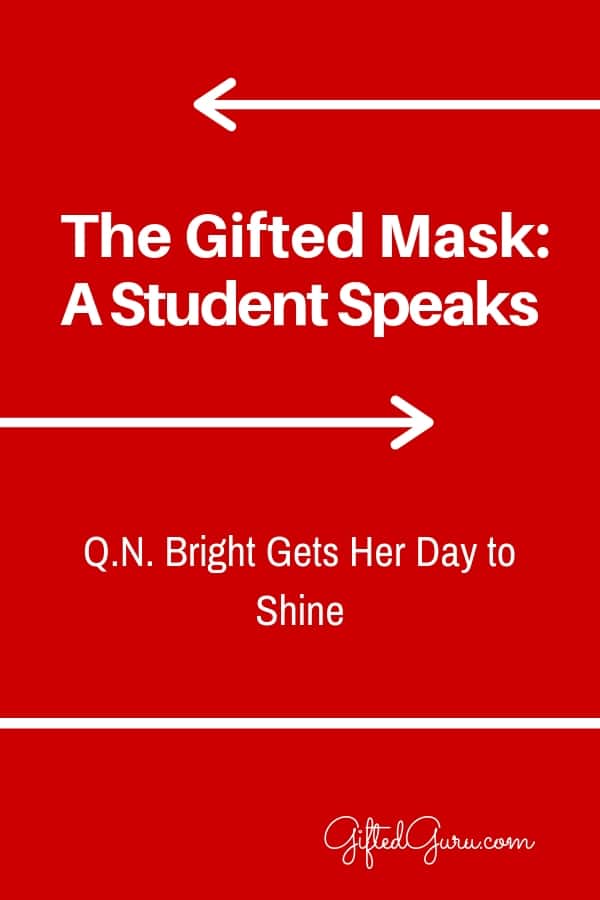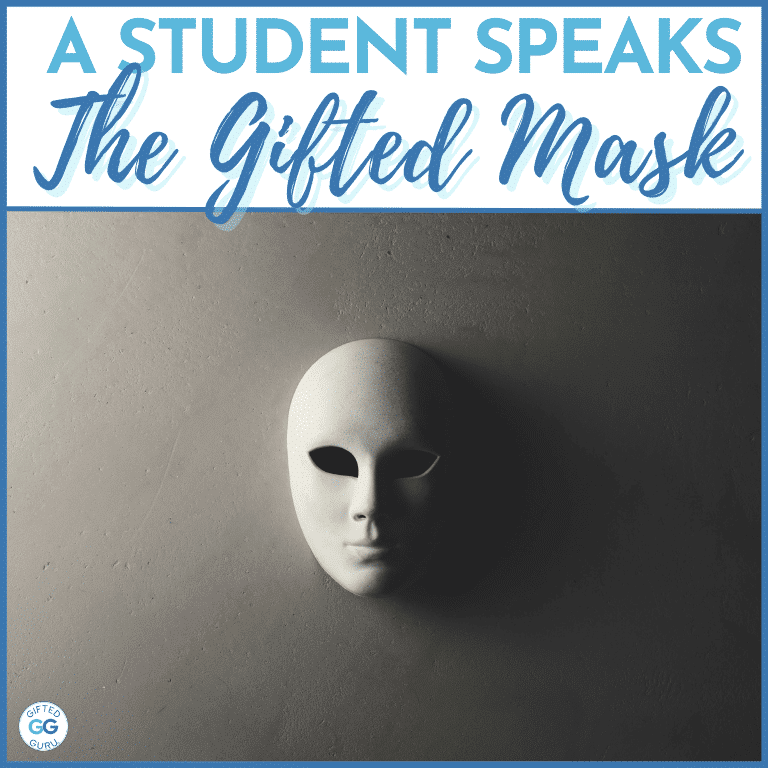The students are the core of what we do, and I think it’s critical that they are also able to be the corps, or body, of what we do.
A gifted student wrote an essay for assignment at school, and she gave me permission to share her thoughts about being gifted here.
Her essay was originally shared with me because she quoted me. I think her thoughts should be required reading for all teachers.
Socialization and Mask Project
The piece she wrote was in response to a project given to her by a great teacher. Q.N. explains:
The socialization and mask project is a powerful project which draws attention to many of the things we take for granted in our world and society.
It begins with students learning about the concepts of socialization, including the cycle of oppression. We learn about the different identity categories (age, ability/disability, race, sexual orientation, gender, religion, and class), focusing on each one individually so that we could grasp each equally well.
We then used our knowledge and applied it to ourselves and our own lives to reflect on our socialization and eventually write an essay and create a mask about it.
After we had created those pieces, we did our best to plan an exhibition that would both inspire and inform guests. This final piece allowed people to dig even deeper into an identity category, which was presented on in the exhibition.
What follows is Q.’s essay without edit or omission.
My Mask
From birth to death, we have a profound lack of choice that many never recognise. Socialization is a process that people go through growing up and living in society. Society teaches us all what we believe, how to act, and even who we are. Without socialization, we have no language, no likes or dislikes. Without socialization, we are not human.
There are seven identity categories that largely cover how we are socialized. Within those, there are agent and target groups. As explained in The Cycle of Socialization by Bobbie Harro, agent groups are not discriminated against, are seen as the norm, and set expectations for the rest of society. These are groups such as Caucasians, men, and heterosexuals. Targets are at the receiving end of discrimination, expectations, and negative stereotypes. People of color, women, and LGBTQ+ people are all examples of target groups.
As an academically advanced girl, I have been socialized to hide my achievements, be uncomfortable speaking about my talents, fear failure, and try to defy stereotypes so that I could be more than just that.
I have been socialized to hide and/or downplay my academic achievements and accomplishments so that others don’t feel bad about themselves or their accomplishments.
This was a rather blunt example of socialization, because when I was in Grade 5, shortly after being labeled “gifted,” a peer told me “We aren’t supposed to talk about it.”
I was confused, being nothing but a nine year old in metallic glasses with chipped paint at the time, and asked if that even applied if somebody asked.
Apparently, the answer was yes.
This taught me to hide a big part of myself to spare others discomfort. If I had been born further into the past, I would have had the misfortune of having limited education, or possibly none at all.
I am unbelievably lucky to have been able to be born into this day and age when I am recognized, even if I am not supposed to acknowledge that.
People don’t know how to handle when others have natural gifts that allow them to do certain things with more ease, so they want them to hide them, or so it would seem.
When you compare this example, though, to someone who is talented at singing or painting, they would absolutely be encouraged to let their talent shine.
Why is this different when the gift is academic?
People would rather that academically advanced and gifted children hide their talents from other children than let the others be a little uncomfortable and eventually learn to accept them.
This worry about others’ feelings about my personal accomplishments still affects me daily. I was recently asked to join a subsection of Johns Hopkins Center for Talented Youth (CTY) called the Study of Exceptional Talent (SET). It is an extremely selective program for students who took the SAT at or before 13 and 10 months and scored 700 or above on one of the sections, with an additional 10 points for every month they have been 13.
I only told one person at school because I didn’t want people to think I was bragging or make some snide comment about something I was extremely excited about.
Even writing this essay, I worry that others will take it as bragging or act like there are absolutely no downsides to being gifted, which is not true. Hiding parts of yourself to spare others’ feelings hurts advanced kids and teach them that a very positive part of themselves that they should be proud of is something bad or shameful that they need to hide to spare others.
As a “gifted” student, I have been socialized to be uncomfortable talking about myself due to the language that they do not help us learn to use.
There are negative connotations perceived in the word “gifted” that people take to mean “I am not.” I do not mean to say that gifted is the wrong word; rather, I would say that gifted is the right word taken the wrong way.
I did nothing to earn this title, I was born this way as surely as I was born with brown eyes. My talents are a gift that I possess, not a skill I worked for.
As stated by Lisa Van Gemert in her article 8 Reasons You Should Label Kids As Gifted, “Some people argue against the term ‘gifted,’ believing it implies superiority or arrogance. I believe the opposite. To me, the word ‘gifted’ as it applies to cognition is a constant reminder that this was a gift, not earned. I think it’s humility inducing, not arrogance producing.”
This may be the view of those who are gifted, or who understand what the label truly means, but it is not the way the label is received in many cases.
Nobody has ever helped me understand how to talk about this part of myself in a way that does not make others uncomfortable; rather, it was suggested we simply keep quiet.
I never had the vocabulary to explain how my brain worked, only the term gifted and a sea of people ready to misinterpret it. Any term, Van Gemert claims, would have the same connotations if it was used to indicate cognitive ability.
How am I to help others understand when any way I could describe it would be shot down? Schools, and, in turn, society (for who raises children en masse but schools), seem to have little interest in helping gifted children to understand what makes them gifted and teaching them how to deal with that, especially when it means explaining what makes them different to others.
Due to the fact that school is almost always very easy for me, I have never had to deal with failure, and as a result, I will collapse when I inevitably encounter it.
Rachel Simmons, a leadership development specialist at Smith College, recognised this happening in her students and acknowledges in the article On Campus, Failure is on the Syllabus” in the New York Times, “For many of our students-those who have had to be almost perfect to get accepted into a school like Smith-failure can be an unfamiliar experience. So when it happens, it can be crippling.”
I expect people to expect me to do well in everything, so I feel that my failure would destroy everything that people think I am, and I have no knowledge of how to operate without that opinion that people hold of me.
Another issue is that I not only feel that I have to be perfect, but I have never had to work to be, which makes me freak out when something takes more effort than usual.
If we don’t challenge our advanced students and instead let them coast, they’ll never learn how to work hard or fail gracefully.
I was socialized to believe that I couldn’t be anything but a “nerdy girl” if I let myself fit those stereotypes. Based on this, I try not to fit that stereotype so that I can be more than just smart.
Humans stereotype everything, consciously and unconsciously. According to the article “Where Bias Begins: The Truth About Stereotypes” published by Psychology Today, “And while we tend to see members of our group as individuals, we view those in out-groups as an undifferentiated-stereotyped-mass.”
In this case, the in-group would be people who are naturally academically average, while the out-groups would be those who perform well above or below average. I am in an out-group, and I am so far into it that I am alone. I try not to conform to the stereotypes of my out-group because I do not want to be seen as alone, or have my out-group be the only part of me that people see.
In a way, I conform to certain other stereotypes because those are the stereotypes of groups that more people see as their own, and humans don’t like being on the outside, alone. I adapted to embody stereotypes that do not feel natural to gain a sense of acceptance and belonging.
In recent years, the No Child Left Behind movement has brought much needed attention and funding to students with disabilities, but it has left gifted children with no resources.
It is a misconception that gifted children will be fine if you leave them be.
They will not be challenged and gain no work ethic or studying skills, which will be a downfall later in life.
“By the time I found work that challenged me, … I realised my work ethic and study skills were atrocious, in large part, I believe, because I had never been forced to use them,” expressed a college student named David in the article Top Students, Too, Aren’t Always Ready for College by Elaine Tuttle Hansen.
In a world where gifted programs are not common, a lot of potential is being ignored in low income and minority students whose parents cannot get them to a school that can support them. As an individual, it seems impossible to change something so deeply ingrained in our society, but I believe that we have a greater influence than we believe.
In conforming and essentially ignoring my gifted label, I am helping to perpetuate our society’s view that this is a topic we must not broach. Speaking out and being real with others about who I am can help to change this.
Advantages given for nothing always come with disadvantages, no matter how invisible they are to others.
By Q. Bright
Wrapping Up:
There’s not much I can add to Q’s eloquent words. I am so glad she shared this with me and allowed me to share it with you.
I invite your encouraging words to her in the comments.
You may also like:
- Why School’s Not Fair to Gifted Kids
- How to Choose a School for Your Gifted Child
- 8 Reasons You Should Label Students as Gifted (an absolute must-read)
Would you like to receive my free monthly newsletter? Sign up and receive a free guide for helping gifted children thrive in school.






